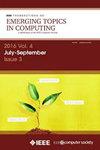Janus: A Trusted Execution Environment Approach for Attack Detection in Industrial Robot Controllers
IF 5.4
2区 计算机科学
Q1 COMPUTER SCIENCE, INFORMATION SYSTEMS
IEEE Transactions on Emerging Topics in Computing
Pub Date : 2024-04-24
DOI:10.1109/TETC.2024.3390435
引用次数: 0
Abstract
In the last few decades, technological progress has led to a spike in the adoption of robots by the manufacturing industry. With the new “Industry 4.0” paradigm, companies strive to automate their production processes by interconnecting and integrating different industrial systems. The resulting increase in complexity contributes to a larger attack surface and paves the way for novel attacks. In the context of cyber-physical systems, consequences include economic and physical damage, as well as harm to human workers. In this article, we present Janus, a novel monitoring mechanism for industrial robot controllers that exploits the trusted execution environment (TEE) to guarantee the integrity of the attack detection algorithm even in case the controller's software is compromised, while not requiring external hardware for its detection process. In particular, we use the state observers strategy for detecting low-level controller (LLC) attacks. We assess our approach by testing it against various attacks, identifying those that are simpler to detect and pinpointing the more elusive ones, which are mostly detected nonetheless. Finally, we demonstrate that our approach does not add significant computation overheads.Janus:用于工业机器人控制器攻击检测的可信执行环境方法
在过去的几十年里,技术进步导致制造业采用机器人的数量激增。在新的“工业4.0”范式下,公司努力通过互联和集成不同的工业系统来实现生产过程的自动化。复杂性的增加导致了更大的攻击面,并为新的攻击铺平了道路。在网络物理系统的背景下,后果包括经济和物理损害,以及对人类工人的伤害。在本文中,我们介绍了Janus,一种用于工业机器人控制器的新型监控机制,它利用可信执行环境(TEE)来保证攻击检测算法的完整性,即使在控制器软件被破坏的情况下,同时不需要外部硬件来进行其检测过程。特别是,我们使用状态观察器策略来检测低级控制器(LLC)攻击。我们通过对各种攻击进行测试来评估我们的方法,识别那些更容易检测到的攻击,并精确定位那些更难以捉摸的攻击,尽管如此,这些攻击大多被检测到。最后,我们证明了我们的方法不会增加显著的计算开销。
本文章由计算机程序翻译,如有差异,请以英文原文为准。
求助全文
约1分钟内获得全文
求助全文
来源期刊

IEEE Transactions on Emerging Topics in Computing
Computer Science-Computer Science (miscellaneous)
CiteScore
12.10
自引率
5.10%
发文量
113
期刊介绍:
IEEE Transactions on Emerging Topics in Computing publishes papers on emerging aspects of computer science, computing technology, and computing applications not currently covered by other IEEE Computer Society Transactions. Some examples of emerging topics in computing include: IT for Green, Synthetic and organic computing structures and systems, Advanced analytics, Social/occupational computing, Location-based/client computer systems, Morphic computer design, Electronic game systems, & Health-care IT.
 求助内容:
求助内容: 应助结果提醒方式:
应助结果提醒方式:


